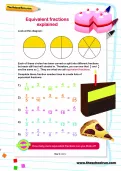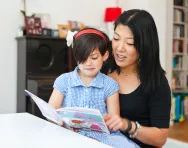Important update from TheSchoolRun
For the past 13 years, TheSchoolRun has been run by a small team of mums working from home, dedicated to providing quality educational resources to primary school parents. Unfortunately, rising supplier costs and falling revenue have made it impossible for us to continue operating, and we’ve had to make the difficult decision to close. The good news: We’ve arranged for another educational provider to take over many of our resources. These will be hosted on a new portal, where the content will be updated and expanded to support your child’s learning.
What this means for subscribers:
- Your subscription is still active, and for now, you can keep using the website as normal — just log in with your usual details to access all our articles and resources*.
- In a few months, all resources will move to the new portal. You’ll continue to have access there until your subscription ends. We’ll send you full details nearer the time.
- As a thank you for your support, we’ll also be sending you 16 primary school eBooks (worth £108.84) to download and keep.
A few changes to be aware of:
- The Learning Journey weekly email has ended, but your child’s plan will still be updated on your dashboard each Monday. Just log in to see the recommended worksheets.
- The 11+ weekly emails have now ended. We sent you all the remaining emails in the series at the end of March — please check your inbox (and spam folder) if you haven’t seen them. You can also follow the full programme here: 11+ Learning Journey.
If you have any questions, please contact us at [email protected]. Thank you for being part of our journey it’s been a privilege to support your family’s learning.
*If you need to reset your password, it will still work as usual. Please check your spam folder if the reset email doesn’t appear in your inbox.
9 easy tips to help your child enjoy reading

1. Involve your child in rebuilding the story
Sometimes the simplest ideas are the best (and the most fun!). Pamela and Maria explain that reading aloud a rhyming book, such as Dr. Seuss, and leaving out a word for your child to fill in can keep them engaged. Your child can simply read the word for you, try to guess at what the word might be, or playfully suggest a different rhyming word that isn't in the book.
"It's fun and it's reading, in its way. And you can persuasively appreciate the result with a clap or a laugh, whichever the case calls for."


Start a unique learning programme!
- Weekly programme for each school year
- Worksheets sent direct to your inbox
- Keeps your child's learning on track
2. Note your reading mistakes and embrace theirs
Everyone, regardless of age or ability, stumbles over words and occasionally misreads what's right in front of them. Pamela and Maria say it's important to embrace these moments.
"Note when you make a mistake and don't make a big deal out of it. This lets your child see that even grown-ups and fluent readers make mistakes when reading. Laugh at your own silly syntax. Let your child laugh at you too. This creates a forgiving atmosphere in which their reading stumbles won't stand out as some form of tragedy."
3. Listen to a story, watch a story
if your child struggles with reading, or perhaps need something else to keep stimulated as well as the printed word, audiobooks, picture books and videos of books with subtitled captions may be the answer you're looking for.
Not reading a book yourself "doesn't mean you don't enjoy stories or appreciate a good narrative. Audiobooks are especially great at teaching everything else literature brings us: nuanced characters, interesting word choices, complex sentence structure, engrossing plots."
4. Submit to the series
Children beginning to read for pleasure will, inevitably, start craving a good series to get stuck into. These days there are hundreds to choose from, and early reading series are particularly good at turning new readers into lifelong readers, though adults might fail to see the appeal of a string of very similar fairies or beasts!
"Explore the available books, and steer your child to a series you think brings a little pizzazz to the table. We suggest mainly stocking up at the library or buying just a few and then swapping with friends, since each book is usually read once and only once."
5. Character connection
We all like to read something we can relate to in some way. We see ourselves in the main character or can relate to the interactions between others; children are the same.
"Be on the lookout for books to bring home that will connect to your reader right where they are – not just as a reader but as a human being. There are books that address nearly every milestone, occasion, worry, fear, goal, and interest (look through TheSchoolRun's book recommendation guides to find titles about football, rugby, performing, superheroes and more; we also have suggestions for books that tackle difficult subjects and great kids' books that feature BAME characters).
"When a book helps introduce a subject or illuminate a topic or answer a burning question, children learn that books are a place to turn for enhancing and enriching their lives.
"In many ways, every book is a kind of self-help book for kids. They anticipate concerns, answer questions, and solve nagging problems. And when children learn from an early age that books can do this for them, they never forget that lesson."
6. Screen stories
We're not talking about watching stories on screens. Pamela and Maria highlight books that have cleverly taken on the subject of screens and the culture around screen time.
"These are excellent choices to give to a kid who may be surrounded by screens and trying to figure out where reading actual books fits into it all. In Hello! Hello! by Mathew Cordell, for example, a heroine ventures outdoors when her family is glued to their screens to notice her."
7. Be the pipeline, not the gatekeeper
It can be difficult as parents not to push our own opinions and interests onto our children. When it comes to books, Pamela and Maria emphasise the need to draw a line between encouragement and pushiness.
"You want to avoid being too pushy or opinionated, but you are still, after all, the pipeline – the main supplier of books in your child's life."
They suggest adopting a tricky combination of enthusiasm and being nonchalant.
"Go ahead and plant books around the house that you've tracked down for her. Keep a stack of your own childhood favourites available and just out of the way. The plan is for your child to 'discover' them when they're ready. They will be found, and when they are, they will be opened by your child, and not by you. For many children, it's an important distinction."
8. Reading outside the book
Reading doesn't always have to involve books. If your child's interest seems to be fading, or it hasn't even begun, Pamela and Maria suggest playing a game with your child instead.
"Many games heavily incorporate reading, from the obvious candidates like word games Boggle and Scrabble and Bananagrams to the less obvious ones like games on the Playstation." Even Monopoly has a lot of words in it, and it all counts as reading.
9. Fostering a book critic
Ask your child to review a book and help them decide what they like – and don't like – to read.
"Thet can use a five-star system, a thumbs-up/thumbs-down, or a scale from one to ten. The more choice you give them, the more they feels in control of the situation. They're choosing the book; they're choosing the review format. Don't make them write anything down unless they actually likes writing!"
Build-a-bookworm quick tips
- Create a comic: "Comics are simple enough for even very young children to write on their own."
- A vacation story: "Ask your child to write captions for the photos from a family holiday. They can pick which ones go in the album and in which order (sequencing!) and write the captions themselves."
- Mummy's biography: "Ask your child to write the story of your life, as they see it. They can interview you about your childhood or your favourite books."
Extract adapted from How to Raise a Reader (Workman Publishing) by Pamela Paul and Maria Russo. Copyright © 2019.









